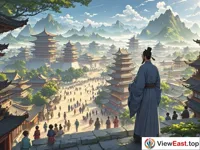

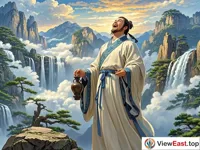
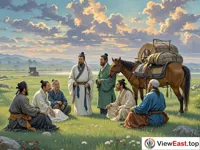
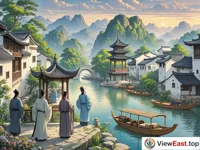
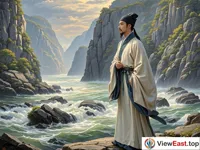
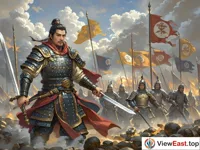
In the long-standing history of China, Tang poetry and Song lyrics represent the brilliant gems of Han Chinese culture, symbolizing not only the peak of classical Chinese literature but also profoundly influencing the cultural demeanor and aesthetic tastes of the Chinese nation.
Tang Dynasty: The Golden Age of Poetry
The Tang Dynasty marks the golden age of Chinese poetry, where poets created numerous timeless poems with their exceptional talent and profound emotions. Tang poetry, with its rich themes, harmonious metrics, and refined language, showcases the breadth and depth of Han Chinese culture.
Du Fu: Known as the "Sage of Poetry," his works such as "Three Officials" and "Three Departures" deeply reflect social realities and the sufferings of the people.
Li Bai: Called the "Immortal Poet," his poems like "Bring in the Wine" and "Ode to the Luoyang Peony" demonstrate his unbridled spirit and yearning for freedom.
Bai Juyi: Famous for his accessible style, poems like "Grass on the Ancient Plain" express his concern for the lives of ordinary people.
Song Dynasty: The Height of Lyrical Prose
The Song Dynasty is the heyday of lyrical prose, where lyricists created a vast array of exquisite works with their delicate touch and deep emotions. Song lyrics, with its graceful style, rich imagery, and musicality, stand as the pinnacle of lyrical expression in Han Chinese culture.
Su Shi: His lyrics, such as "Nian Nu Jiao · Recollecting the Red Cliff" and "Shui Diao Ge Tou · Mid-Autumn Festival," are known for their bold and unconstrained style and profound contemplation of life.
Li Qingzhao: Revered as the "Queen of Lyrics," her works like "Ru Meng Ling" and "Sheng Sheng Man" are celebrated for their gentle and nuanced depiction of emotions.
Xin Qiji: Known for his bold and unconstrained lyrical style, works like "Qing Yu An · Lantern Festival" express his patriotic feelings and unfulfilled ambitions.
Far-reaching Influence
Tang poetry and Song lyrics have not only enriched the connotation of Chinese literature but also influenced the cultural development of subsequent generations. With their unique artistic charm, they have become an integral part of the Chinese national culture, affecting Chinese people's values, aesthetic tastes, and modes of expression.
Conclusion
Tang poetry and Song lyrics, as treasures of Han Chinese culture, not only display the emotions and wisdom of ancient literati but also profoundly shape the cultural identity and aesthetic pursuit of the Chinese nation.